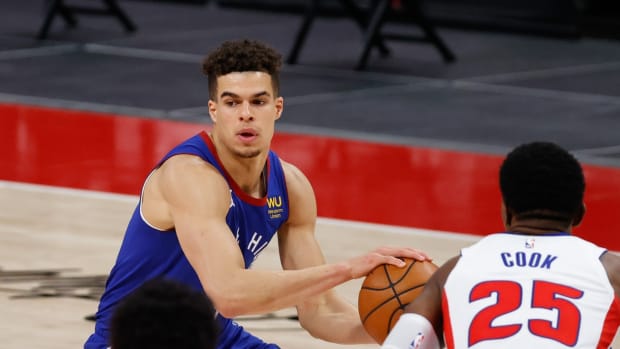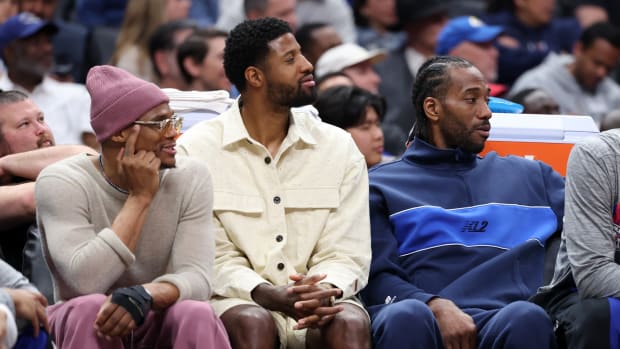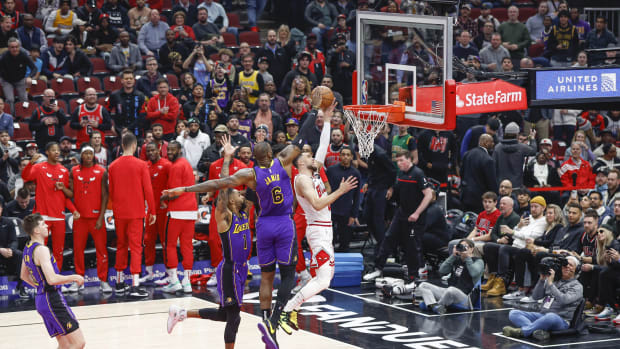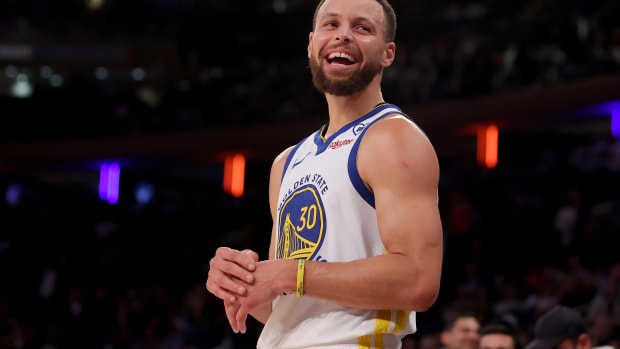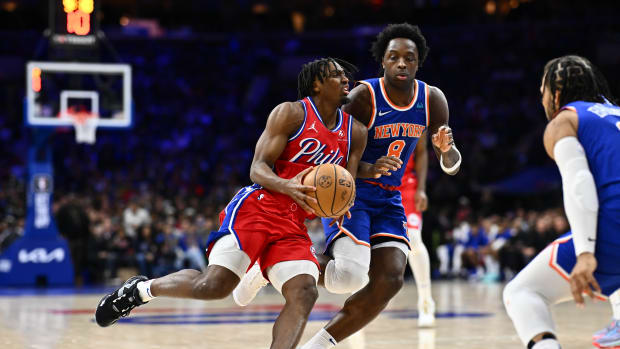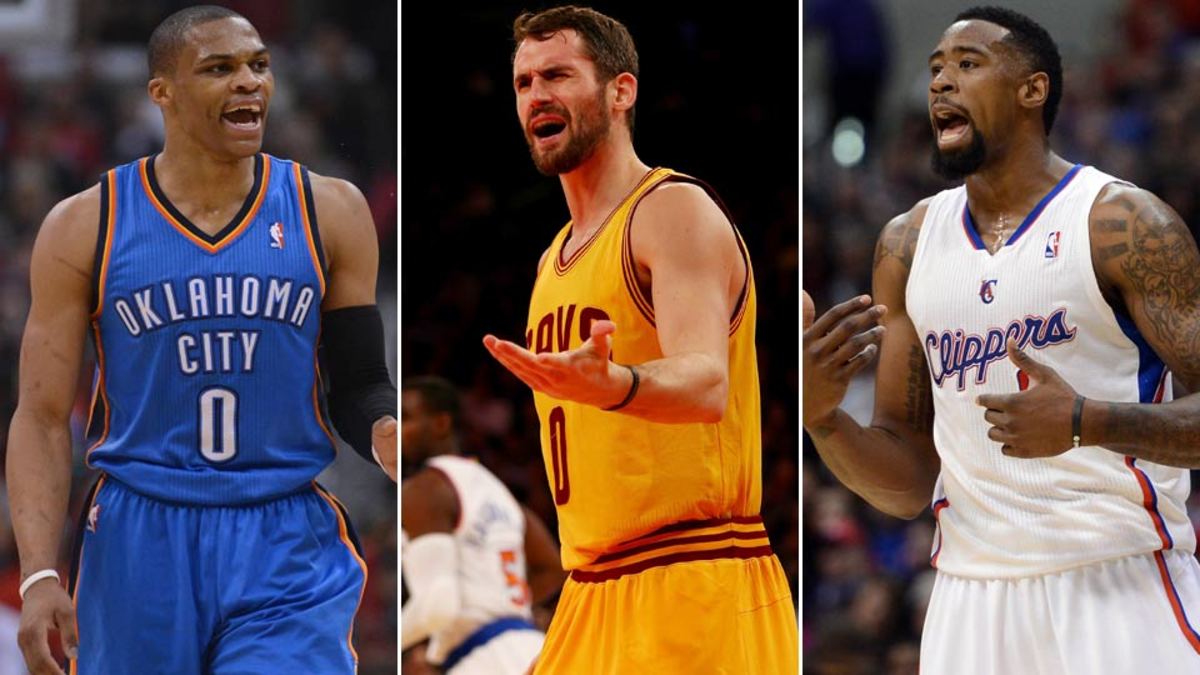
The All-Bullseye Team: Five players facing the postseason microscope
Welcome to the second annual All-Bullseye Team, which highlights five players who will be facing immense scrutiny during the upcoming playoffs.
LeBron James’ offseason return to Cleveland plus Atlanta’s extraordinary season has injected new excitement into the East landscape, while Golden State’s arrival coupled with injuries to the likes of Kevin Durant, Blake Griffin, Dwight Howard and Wesley Matthews have made for another unpredictable season in the unforgiving West.
James’ push for a fifth straight Finals appearance and the Warriors’ drive for the franchise’s first title since 1975 are guaranteed to dominate headlines come April, but these five impact players will all take their turns under the postseason microscope, for all sorts of different reasons. Let’s take a look. (All stats through March 10.)
PG: Russell Westbrook, Thunder
Truth be told, last year’s point guard nominee for this list, Chris Paul, could easily be right back here again after another second-round exit that saw him crumble in key late-game situations. Paul is putting together another sensational season (18.2 PPG, 10.2 APG, 4.8 RPG) and he’s kept the Clippers in the mix despite an elbow injury to Blake Griffin and a bench demolition courtesy of Doc Rivers. Paul will enter the 2015 playoffs very in much the same spot as last year: as one of the most accomplished floor generals never to have reached the conference finals.
But Paul’s story isn’t entirely the same, thanks to the rise of MVP candidate Stephen Curry and the recent run enjoyed by Russell Westbrook. For the first time in years, Paul, 29, isn’t the hands-down, consensus top point guard in the league. The Warriors are 10 games up on the Clippers, Curry could easily win the MVP (something Paul has never done), and the future is absolutely brighter and more defined in the Bay Area than it is in SoCal.
Russell Westbrook cannot be stopped
Wedging his way into what might have been a smooth handing of the “Best Point Guard in the NBA” baton from Paul to Curry is Westbrook, who isn’t so much a point guard as he is a weapon of mass destruction. The physical, fast, strong, relentless, confident, smart Westbrook should enter the playoffs as the league’s most feared player, James aside. (Of course, Oklahoma City’s playoff fate isn’t yet guaranteed, as they are just one loss up on New Orleans for the No. 8 spot.)
You can go on and on gushing about Westbrook’s attack mentality, his ability in the open court, his improved passing skills, and all the rest of it, but maybe it’s easier to note that he broke a bone in his face and remained in the game. How is it possible that a player can undergo five surgeries in less than 24 months (three on his knee, one on his hand, one on his face) and somehow seem more indestructible after each one?
Westbrook seems to have turned a corner in the court of public opinion over the last month, as he put together four consecutive triple doubles (for the first time since Michael Jordan accomplished the feat in 1989), topped 40 points in three straight games and six times in the last six weeks and inched into the MVP conversation during Durant’s absence. His peacocking “style” and chippy media interactions remain ripe for mocking, but his game doesn’t appear to be nearly as polarizing as it was two or three years ago. Durant’s absence has allowed Westbrook the opportunity to average a career-high 27.4 points while also dishing a career-high 8.3 assists, and his playmaking instincts and ability to read defenses have been on full display because the Thunder are so reliant upon him for their offense.
To be clear, his general approach hasn’t changed all that much—he’s still too fast for his own good sometimes, he’s still not a knockdown perimeter shooter, he’s still a little too quick to pull the trigger—but his will has a way of wearing on his critics. Night after night, Westbrook brings it, and the Thunder are 9-4 since the New Year without Durant in the lineup, even though GM Sam Presti shook up the roster at the trade deadline. Anecdotally, it just seems like there are fewer people on social media rooting for Westbrook to fail.
Give and Go: Can anyone edge Jahlil Okafor for No. 1 in 2015 NBA draft?
Derided as selfish and hotheaded earlier in his career, Westbrook finds himself on this bullseye list not for those critiques but for two other reasons: the burden of greatness, and the uncertainty around Durant.
Unlike Paul, the 26-year-old Westbrook has reached the conference finals twice and the Finals once, even though he missed virtually the entire 2013 postseason with a knee injury. He’s also scored playoff-series victories over the likes of Paul, Tony Parker and Mike Conley along the way. Plus, let’s not forget that the historical comparisons for Westbrook’s stats really began in last year’s postseason, when he averaged 26.7 points, 8.1 assists and 7.3 rebounds—playoff numbers that had only previously been posted by Oscar Robertson (minimum: five games). Westbrook will go under the playoff microscope because he’s already set a very high bar and because he’s playing so well recently that he looks poised to raise that bar even higher. That’s a tantalizing thought, given that he opened the year at the No. 4 spot on SI.com’s “Top 100 Players of 2015” list.
Durant’s return, which doesn’t yet have a firm return date, adds a serious layer of complexity to all of this. Westbrook can’t possibly impact the game in the same manner that he has been once Durant is back on the court. If Durant is rusty or less than 100 percent, Westbrook could find himself criticized for failing to involve Durant enough, for failing to step in and save Durant and for everything else in between those two poles. That’s not a particularly enviable place to be, especially with the prospect of facing Curry and the world-beating Warriors in the first round.
There’s a very real possibility that Westbrook, as the face of this year’s Thunder, will be subjected to undue criticism if Oklahoma City is bounced early, whether because Durant can’t get totally right, because Golden State simply proves to be better, or because Westbrook himself fails to live up to the hype. Civil minds would do well to remember that Durant largely escaped blame when the Westbrook-less Thunder lost to the Grizzlies in 2013, and that the same treatment should be afforded to Westbrook if the roles wind up being reversed.
In the meantime, go ahead and start salivating at the prospect of Warriors/Thunder, which on paper looks like the best first-round matchup in years. Who knows how that series will play out, but one thing is for sure: Westbrook’s fingerprints will be all over it.
SG: James Harden, Rockets
Fair or not, James Harden will either: 1) get the monkey off of his back by leading the Rockets out of the first round, or 2) watch the monkey grow into a Godzilla that casts a shadow over the rest of his remarkable season.
In large part because of his steady rise over the last three years, Houston’s three-time All-Star finds himself perfectly positioned for such a cut-and-dry dichotomy. Harden has ticked off a number of boxes since the 2012 trade that sent him from Oklahoma City to Houston: he’s blossomed from a sixth man into one of the top scorers in the league, he’s earned All-Star and All-NBA honors, he’s been the No. 1 guy on a playoff team, he’s been cast as the future of NBA offense because he can draw fouls, create shots and hit threes and he’s emerged as an MVP candidate this year by carrying the Rockets to a 43-20 record despite Howard’s extended injury absence.
Roundtable: NBA's 2014-15 MVP race
The next logical box to check is “win a playoff series.” Yes, Harden was a key piece during two deep runs with the Thunder in 2011 and 2012, but he would surely be the first to admit that there’s a big difference between being a “key piece” and “the man.” Houston went one-and-done in six games in both 2013 and 2014; last year’s loss was particularly bitter, as Damian Lillard sent the Rockets packing with a miracle, series-clinching, buzzer-beating three-pointer.
An injury like Howard’s would usually serve to decrease expectations, but that’s not really the case here, as Harden finds himself haunted a bit by his previous postseason performances. Harden failed to shoot 40 percent from the field in either the 2013 or 2014 playoffs, he connected on less than 30 percent of his three-pointers against the Blazers last year and he has dealt with some turnover problems as well. Of Houston’s two stars, Howard was more reliable and forceful during the 2014 playoffs. If that’s the case again this year, something will almost certainly have gone wrong.
• MORE NBA: Harden isn't the only one picking up slack in Houston
Harden’s consistency throughout this season has solidified his standing as the Rockets’ be-all and end-all, a fact that ensures he will bear the brunt of the criticism if the Rockets suffer another early exit. His up-and-down play in the 2012 Finals, his uncanny ability to get to the free throw line and infuriate opponents and opposing fan bases in the process, his tendency to embellish contact, and his recent flagrant below-the-belt kick to James combine to reinforce his punching bag potential.
This story very much remains to be written due to Howard’s uncertain status and a first-round match-up that is guaranteed to be tough. There would be no great shame in losing to the Clippers or the Spurs, even if the Rockets entered the series with home-court advantage, but a third straight early exit would, to some observers, push Harden another step closer to Tracy McGrady territory—the phenomenally talented scorer whose ability to generate highlights vastly exceeded his postseason accomplishments. Although leading the Rockets to the second round might not totally silence Harden’s critics, at least they would need to adjust their material.
SF: Nicolas Batum, Blazers
Clearly, the timing of Wesley Matthews’ season-ending Achilles injury was horrible. For Matthews, it meant millions of dollars in lost earnings this summer, when he was set to become an unrestricted free agent and cash in on the biggest payday of his career. For the Blazers, his absence stretches the team’s defense and depth, moving the team out of the “fringe contender” discussion.
Matthews’ injury also has the potential to upend management’s carefully laid plans. Just a few weeks ago, Blazers GM Neil Olshey was pitching his organization’s “win now” mentality with the Arron Afflalo trade. That was the right mentality at the time, given Portland’s strong start to the season and the fact that three key starters will be in line for major paydays this summer, but things can change quickly. Now, Olshey and company must reassess the ceiling of this group, knowing that: 1) All-Star forward LaMarcus Aldridge is expecting a max contract this summer, 2) starting center Robin Lopez is in line for a meaningful pay raise, 3) Matthews and Afflalo (player option this summer) are both long-term question marks, and 4) Lillard will be commanding a max rookie extension in the not-too-distant future.
Trends: Which NBA teams are surging, swooning heading into home stretch?
The question basically boils down to this: Is it worth paying to keep all of the current pieces in place to pursue a title or is it time to restructure the cast around the Aldridge/Lillard pairing? The easy answer, before Matthews’ injury, was to continue on with the status quo. Now, knowing that Matthews might not be a major contributor for a good chunk of next season, is that still the case? Is it worth potentially paying the luxury tax in 2015-16 for a roster that could find itself waiting on Matthews and stuck without many major bench contributors?
Factoring heavily into this decision is Nicolas Batum, who has been struggling through an unfortunate, never-ending nightmare of a season. Pick virtually any stat or measure and Batum is down (often way down) this year: field goal percentage, three-point percentage, scoring, rebounding, assists, PER, and Win Shares. A dependable two-way guy who played well in the 2014 playoffs, Batum has been shaky this year, even though injuries to Lopez and others have put coach Terry Stotts in a position to ask more from him.
• MORE NBA: Blazers prepred for life without Wes Matthews?
The loss of Matthews has the potential to be a flashpoint for Batum. Stotts needs someone to step in and fill the floor-spacing, high-volume shooting void, and it will be a huge problem if Batum remains the reluctant, inconsistent shooter he’s been all season. Stotts needs someone to step up as a lead perimeter defender; Batum’s length, experience and versatility make him an obvious candidate, but the Frenchman will need to show he can contribute at the level he was accustomed to playing at throughout his seven-year career. Without Matthews’ dependability, Portland’s starter-heavy construction just isn’t in position to withstand a weak link during a first-round series. There will be nowhere for Batum to hide if he is that weak link.
Going forward, it’s worth noting that Batum is about to enter the final year of his current contract, which will pay him $11.9 million next season. If the Blazers fail to advance in the playoffs and then decide to pivot with their planning, he becomes a very intriguing piece. Someone will be interested in buying low on him after an anomalous season, especially because such a deal wouldn’t require taking on long-term salary commitments. If Blazers owner Paul Allen decides that he isn’t willing to stomach a monster payroll, dumping Batum to a team with cap space could potentially facilitate the retention of Aldridge, Lopez, Matthews and even Afflalo, if they are all deemed higher priorities.
Batum has spent the entirety of his career in Portland and has been a Rose City fixture, even during his 2012 restricted free agency flirtation with Minnesota. The Blazers were smart to stick with him through his struggles this season, although the decision was made easier by the team’s absence of a potential replacement on a weak bench. It’s now time for Batum to repay that patience with a strong postseason or potentially face the consequences this summer, when Portland must sift through the questions raised by Matthews’ horrific turn of events.
PF: Kevin Love, Cavaliers
Cleveland’s blowout victory over Dallas on Tuesday looked like their dream come true. The Cavaliers’ “Big 3” combined for 70 points, with LeBron James leading the way, Kyrie Irving playing sidekick, and Kevin Love posting 21 points and 14 rebounds, while starting fast breaks with his outlet passes and punishing mismatches both inside and out. They looked every bit the title contender, as all five Cleveland starters racked up +20 plus-minus ratings on the road against a West playoff team.
NBA Power Rankings: Spurs sneak up, Thunder continue climb up rankings
Love, in particular, looked both sharp and happy. That hasn’t always been the case this season, as he missed out on the All-Star Game and is averaging just 16.9 points, his lowest mark since 2009-10. Before the trade to acquire Timofey Mozgov, Love’s defensive limitations were exposed for all the world to see. Even after the trade, he’s been forced to adjust to a new world order on offense, as his usage rate has plunged from 28+ over the last three seasons to 21.7 this year, his lowest mark since his rookie campaign.
It’s not going too far to suggest that Love has been working his way through an identity crisis. “I know I’m not a stretch four,” Love said earlier this month, according to Cleveland.com. “I’m a post player that can shoot. Right now I’m just doing what I’m called to do. For good, bad or indifferent, I’m playing my role and doing what’s asked of me.”
In an ideal world, Love’s self-definition would be accurate. Perhaps Cleveland will still be able to consistently get him there, as they did on Tuesday, when he scored 10 points in the paint to go with his six three-point attempts. For much of the season, though, Love has been a lot stretchier than he’s probably willing to admit. Indeed, 41 percent of his field goal attempts this season have come from outside the arc, by far a career high.
Check out the following chart, which shows the progression of Love’s field goal attempts from year to year throughout his career.
The decline in two-point attempts is both dramatic and steady. As a rookie, 97 percent of his attempts came from inside the arc, the type of number you would expect to see from a low-post player like Dwight Howard. By year four, only 73 percent of his attempts came inside the arc, a figure that’s closer to a power forward like Dirk Nowitzki, who mixes in three-pointers with his mid-range and post-up games. This year? He’s down to just 59 percent from inside the arc, a figure that is very comparable to a stretch 7-footer like Spencer Hawes (58 percent).
Love’s point when it comes to the semantics of defining his skills is that moving to Cleveland didn’t cause him to forget how to rebound in volume and beat his defender one-on-one on the low block. If he returned to the Timberwolves, or moved on to a different situation, he’s still capable of being an alpha dog and an inside/outside threat.
• MORE NBA: 'Playoff LeBron' still looms for East-leading Hawks
What he will likely find out—or rediscover over the next 2-to-3 months—is that those hypothetical alternatives won’t matter at all in the public discourse about his play. As he approaches the postseason for the first time in his career, Love will be judged only on the role that he plays in Cleveland and whether he contributes to meaningful postseason success.
Love is in a tough spot familiar to the Heat’s Chris Bosh and others: facing superstar expectations while technically playing a complementary role. He would do well to learn from Bosh’s experience, which showed that even back-to-back titles didn’t quell the chatter that Bosh was underperforming or shrinking in the moment. Of course, Love would also do well to heed James’ subliminal advice, which urged Love to “just FIT IN [and] be a part of something special.” Any perceived postseason friction among Cleveland’s stars has the potential to set off a distracting storm of rumors, given Love’s upcoming free agency.
Cleveland’s second-half surge has raised expectations to the point that anything short of an East finals appearance would be a massive disappointment. A NBA title is definitely in play, even though that looked impossible pre-Mozgov. Because James’ presence has a way of raising the stakes and heightening the scrutiny, Love’s first trip into the postseason has the potential to be, if everything breaks right, the feel-good story of the year. If the Cavaliers stumble, though, Love’s role and fit heading into free agency could easily wind up being the league’s biggest powder keg.
C: DeAndre Jordan, Clippers
When SI.com checked in with DeAndre Jordan back in January, he was preaching patience with the up-and-down Clippers, lauding Batman’s virtues, and laying out the many lessons he has taken from his previous postseason experiences. Since then, the free-agent-to-be has taken his game to a new level, teaming with Paul to fill in the gaps during Blake Griffin’s absence due to an elbow injury.
Jordan is averaging 11.2 points, grabbing a league-leading 14.5 rebounds, shooting a league-leading 72 percent, and leading coach Doc Rivers to hype him as a Defensive Player of the Year candidate (again). Since the All-Star break, Jordan has averaged a whopping 18.5 rebounds per game, erasing any lingering doubts that he is headed for a massive payday this summer.
DeAndre Jordan flourishing in Blake's absence, but can the Clips keep him?
Much like Harden, though, Jordan risks having his career-year progress wiped under the rug if things don’t go well in the playoffs. In a cruel twist, though, Jordan’s exposure is tied to a weakness with seemingly no obvious answer: his historically poor free-throw shooting.
Now, Jordan has never been competent from the stripe. He holds a 42 percent free-throw shooting average over his seven-year career. That’s terrible. He’s shot better than 46 percent just once in his career. Until recently, it didn’t matter all that much: Jordan never attempted more than three free throws per game before the 2013-14 season and the 2014 playoffs.
That’s changed. This year, Jordan is shooting 5.1 free throw attempts per game and connecting at just a 40.1 percent clip. That’s the second-worst mark in NBA history among players with at least five attempts per game; only Wilt Chamberlain in 1968 can claim a worse percentage.
But, wait, there’s more. Since the All-Star break, with Griffin sidelined, it’s gotten even worse: Jordan is averaging 9.7 free throw attempts per game and connecting on just 37.1 percent. That level of ineptitude practicably demands the “Hack-a-Shaq” treatment, and Western Conference playoff teams have test-driven the strategy over the last month. Jordan attempted 26 free throws against the Rockets on Feb. 11, 28 free throws against the Spurs on Feb. 19, and 17 free throws against the Grizzlies on Feb. 27. All those shots make for an ugly, choppy game, but Jordan failed to make any of those teams pay, hitting less than half of his shots against all three opponents. Without a doubt, the strategy is here to stay.
• MORE NBA: Clippers' Jones to appeal fine for bumping Warriors' Green
Rivers’ bench is a mess and he will have no choice but to rely on Jordan for heavy minutes in the postseason. In the 2014 playoffs, Jordan was sent to the line more than eight times per game and he hit just 43 percent. In a six-game loss to the Thunder in the conference semifinals, Jordan hit just four of his 19 free throw attempts. With Spencer Hawes and Glen Davis as the Clippers’ leading back-up options, coaches will surely be tempted to force Rivers’ hand by hacking Jordan in hopes of sending him to the bench. Rivers and Jordan are left hoping that Jordan can hit a passable percentage and that Griffin will return at full health to provide cover for Jordan and to help exploit opportunities to get into the bonus.
Things could be worse for Jordan, as even a disastrous showing from the stripe isn’t going to meaningfully impact the value of his next contract. Still, this is an incredibly talented, athletic and hard-working player who, like Paul, is itching for a taste of serious postseason success. It would be pure torture for something as simple as an unguarded shot from 15 feet standing in the way of achieving those goals. The foul line can be a lonely, unsheltered place when the rest of the basketball world is judging you, again and again, based on your biggest weakness instead of your many strengths.




































